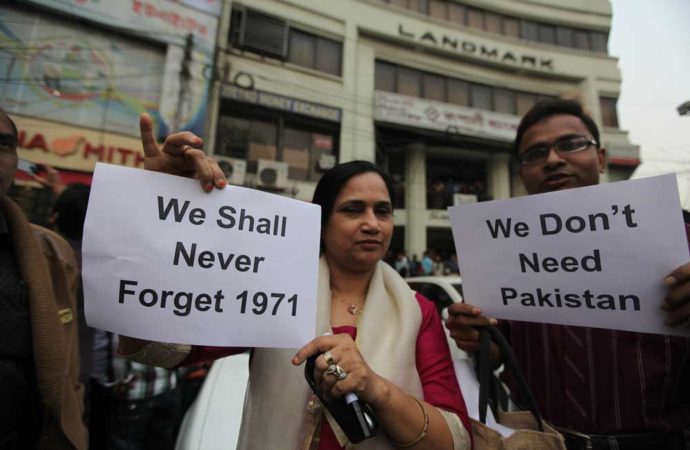The war crimes trials are not about vengeance, but something much more important. This is the first part of a two-part long form
It has become a common and notorious practice on part of the Pakistan government to condemn the execution of war criminals in Bangladesh.
The recent claim made by Pakistan that Bangladesh has violated the India-Pakistan-Bangladesh tripartite agreement, commonly known as the Delhi Agreement of 1973, by executing war criminals, is not justifiable under international law.
According to the principle of “universal jurisdiction” followed in international criminal law, no embargo can be imposed upon the trial of international crimes such as genocide, crimes against humanity, war crimes, etc.
It means the trial for the accused of these crimes can take place any time by any country having competent jurisdiction. In line with that, Bangladesh in a post-war society enacted the International Crimes (Tribunal) Act in 1973. Though Bangladesh has only recently initiated the trial of the local collaborators after four decades of its independence, it is very unfortunate that we are yet to commence the trial of the Pakistani military officials.
Among other factors, many countries that were historically burdened with potential accusations of committing international crimes are quite eager to turn a blind eye and forego consideration of trying the Pakistani forces.
This poses a question: Why is it that whenever genocide or acts of brutality occur in the West, we see world leaders flying in to attend memorial services, and find expressions of solidarity pouring in from all over the world, but the issue of millions of Bengalis who were the victims of genocide, crimes against humanity, and war crimes in 1971 get considered “normal”?
I am not trying to underestimate the gravity of genocidal acts which have happened or are happening now in any part of the world.
Rather, I want to question the role of both the state machinery and the global community in failing to punish the primary perpetrators such as the Pakistani military forces.
Arguably, the war crimes trials are not only about punishing local collaborators over holding those Pakistani officials accountable. To quote Dr MA Hasan, convener of the War Crimes Facts Finding Committee: “The trial is never a question of vengeance but of restoring the dignity of a nation.” How far have we been successful in this respect? It remains unanswered.
Why the trial of Pakistani officials did not take place for many years has been eloquently elucidated in the book The Bangladesh Military Coup and the CIA Link, written by BZ Khasru, in which the author sketches a political portrait of Pakistan-US alliance and diplomatic geo-strategy concerning Bangladesh’s Liberation War during and after 1971.
I want to question the role of both the state machinery and the global community in failing to punish the primary perpetrators
Four months into his presidency, as the fact is shown in the book, Pakistan’s then President Zulfikar Ali Bhutto wrote to US President Richard Nixon requesting him to influence Bangladesh not to put Pakistani soldiers on trial on charges of atrocities committed during 1971.
However, Bangabandhu Sheikh Mujibur Rahman was determined to try Pakistani POWs. But, at one point of history, we witnessed those POWs getting repatriated to Pakistan.
Initially, the issue of recognising Bangladesh as an independent state by Pakistan was subject to Bangabandhu’s holding off the war crimes trials in Bangladesh. Moreover, Pakistan was creating pressure on Bangladesh with the support of its allies to free the majority of the Pakistani POWs. Zulfikar Ali Bhutto threatened that if Bangladesh carried out the trial of 195 POWs, Pakistan would also hold similar tribunals against Bangladeshis trapped in Pakistan.
In an interview on May 27, 1973, Bhutto said: “There will be specific charges [against Bengalis held in Pakistan now]. How many will be tried, I cannot say.” To prove that it was not just an empty threat, around 203 Bengalis were immediately detained as “virtual hostages” by the Pakistan government for 195 POWs.
Fearing for the fate of the thousands of Bengalis held in Pakistan, and to gain the much-needed access to the UN, Bangladesh was finally required to accept Pakistan’s proposal.
In this connection, 195 POWs accused of genocide and war crimes were repatriated to Pakistan under the Delhi Agreement, and in exchange, Pakistan promised that it would hold the trial of 195 POWs on its own soil.
Relying on Pakistan’s promise, Bangladesh then withdrew its demand for trying the Pakistani soldiers in Dhaka.
Source: Dhaka Tribune










